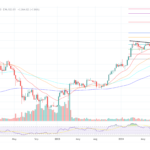
Key Points
- MicroStrategy (MSTR) has secured a position among the top 100 publicly listed companies in the U.S. market.
- The company’s strategic investments in Bitcoin have resulted in a significant increase in its stock prices.
MicroStrategy, branding itself as the “world’s first Bitcoin development company,” has experienced a significant rise in its stock prices, securing its position among the top 100 publicly listed companies in the U.S. market.
The firm’s strategic investments in Bitcoin (BTC) are paying off, with the company recently making a groundbreaking purchase of $4.6 billion worth of Bitcoin.
MicroStrategy’s Impact on Trading Activity
This purchase coincided with the announcement of $1.75 billion in convertible notes, a figure that swelled to $2.6 billion two days later due to overwhelming demand. This move has not only led to a meteoric rise in the company’s stock but also propelled MicroStrategy’s market value beyond tech giants like Intel and Dell.
MicroStrategy’s bold moves have had a significant impact on trading activity. Eric Balchunas, senior ETF analyst at Bloomberg, highlighted that MSTR became the most traded stock, surpassing trading activity in Tesla and Nvidia.
A Record-breaking Day for Bitcoin Markets
The ripple effect of MicroStrategy’s actions also resonated in the broader Bitcoin market. Balchunas noted that the Bitcoin Industrial Complex set a new record with $50 billion in volume, a figure comparable to the average daily volume of the entire UK stock market.
MicroStrategy’s Bitcoin reserves could continue climbing, given the scarcity of Bitcoin’s total supply. Nate Geraci, President of The ETF Store, emphasized that nearly 20 million BTC have already been mined out of the capped 21 million supply.
At press time, MicroStrategy’s Bitcoin holdings stood at $31.51 billion, spanning 12 acquisitions in 2024 alone. The company’s calculated Bitcoin bets appear to have catapulted the company into an elite league of market leaders, underscoring the growing influence of Bitcoin in traditional financial markets.









